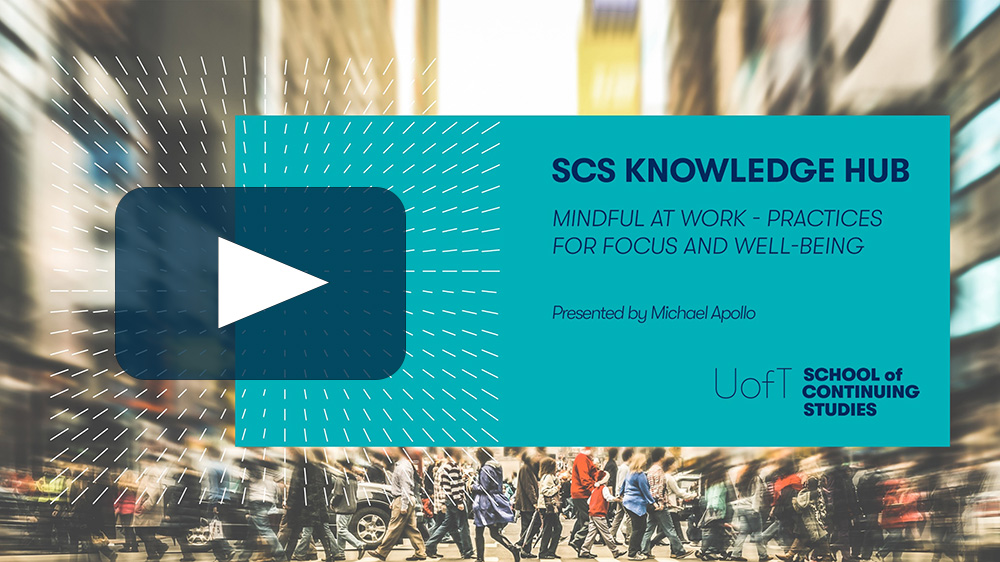
"I would go to class on Tuesday night and on Wednesday morning I'd be trying to implement something that I learned." - Tilo McAlister, SCS learner
When Tilo McAllister found himself working in B2B (business-to-business) marketing, he knew he would need to hone a very specific set of skills. So when it was announced that SCS instructor Tyler Calder, who McAllister had already taken Search Engine Marketing with, would be teaching a new B2B Marketing course, the next step in his learning journey was clear.
“A lot of the marketing courses out there are catering to B2C (business to consumer) and B2B and all this different stuff, trying to be everything at once, and I liked that this course was very focused,” he explains.
Currently the national sales and marketing manager for T&T Power Group, McAllister says his background was in sales, but he was always drawn to the storytelling aspect of marketing.
“While I do love the one to one nature of sales, I really like being able to influence the overall communication strategy of the company and the messaging that we put out to our audience and the entire marketplace,” he elaborates.
The knowledge and skills McAlister picked up in his B2B Marketing: Fueling Revenue Growth classes were instantly applicable to his work.
“All of the assignments and practical work exercises that we did, I just did on my current business. So I was able to develop content and strategies that I'm using right now,” he says.
“I would go to class on Tuesday night and on Wednesday morning I'd be trying to implement something that I learned, so that was really cool.”
McAllister says one of the most valuable lessons he learned in class was about taking a coordinated approach to marketing and sales strategy.
“They are truly integrated at this point,” he says. “They don't exist in a silo. They really have to be united and coordinated in their strategy and I think that was kind of one of Tyler’s major messages throughout the course.”
Calder’s advice was particularly valuable to McAllister because he speaks from up-tp-date professional experience in both sales and marketing management. McAllister says he also found himself pleasantly surprised at the level of engagement Calder was able to encourage through his welcoming and informal online teaching approach.
“I've done a number of online courses and it's just a ghost land of blank profile pictures and it seems like the poor instructor is just talking to nobody,” he explains.
“I've never been in a course with that many people who are just comfortable to be on camera for the entire thing. And because of that I really feel like I connected with the other people in the class a lot more. It was really nice.”
In addition to enjoying Calder’s teaching style, McAllister says the course content was appropriately challenging, while also being applicable to his work right away, and that he got a lot out of participating in the course live.
“The discussions that would come up were really good. I liked having the opportunity and the invitation to actually participate in a bit of a dialogue, not just one way content,” he shares.
“Every week there was a good question that led to a little bit of debate and it would often be a question he would ask at the start where everyone would chime in and give their opinion and then he would share his. That was that was a fun learning process.”
Asked who he would recommend the course to, McAllister says it's fantastic for people who are maybe new to marketing or new to B2B because it covers excellent foundational knowledge.
“I'd say the group that I was with were all either kind of new to marketing or new to B2B or some of them just were maybe feeling a little stale after being in marketing for a long time and maybe not being so versed in newer up-to-date practices, specifically in digital marketing,” he adds.
For himself, McAllister says the course has helped him gain newfound confidence in his own skills and abilities.
“In my case, I took it on because I have the sales background that I have a lot of industry knowledge now but I felt like I was kind of missing a real chunk of foundational knowledge. We've been having great wins and success with our marketing, but I thought, you know, if I actually knew what to do, this would be easier,” he laughs.
“I think having some formal education empowers you to defend your ideas a little bit better and stick up for yourself in the discourse of business strategy and give a reasoning behind your gut feelings.”
For anyone thinking about taking B2B Marketing: Fueling Revenue Growth, McAllister’s advice is simple: “Just do it,” he says. “But maybe more so, expect to enjoy it. I look forward to Tuesday night's lecture, like I look forward to like dropping volleyball on Thursdays.”














